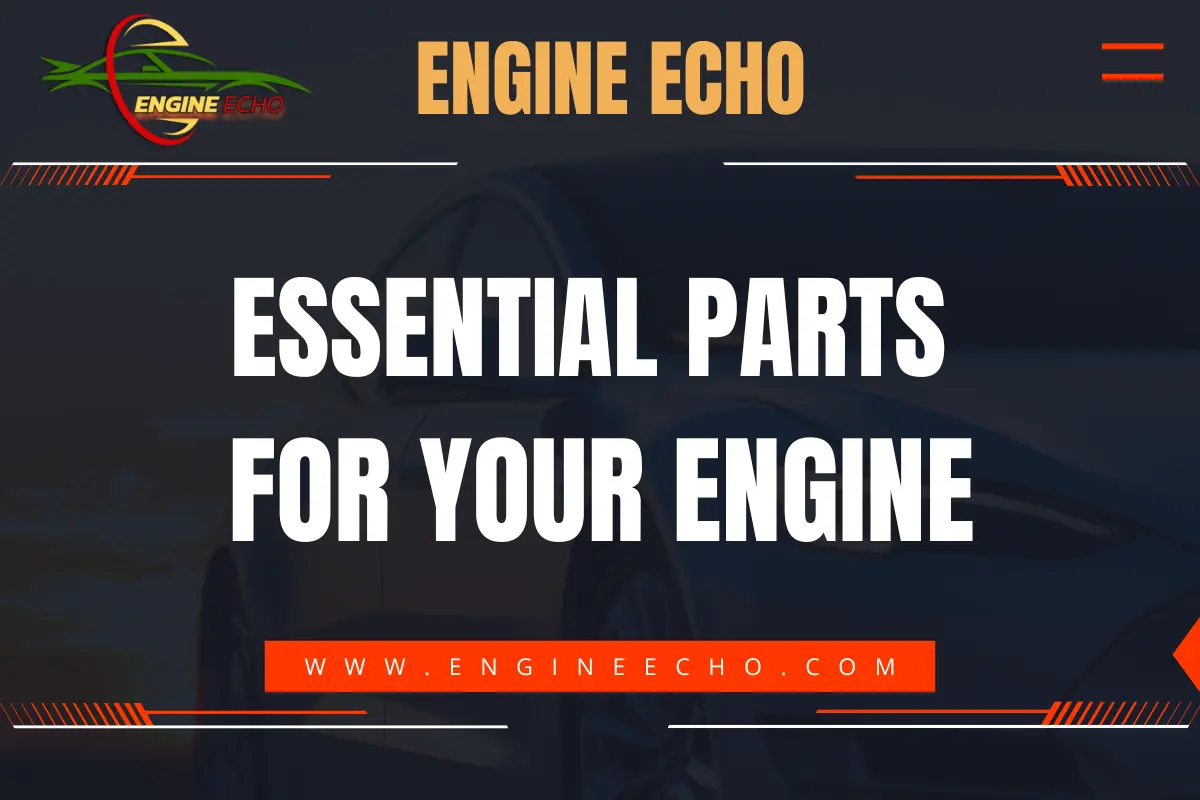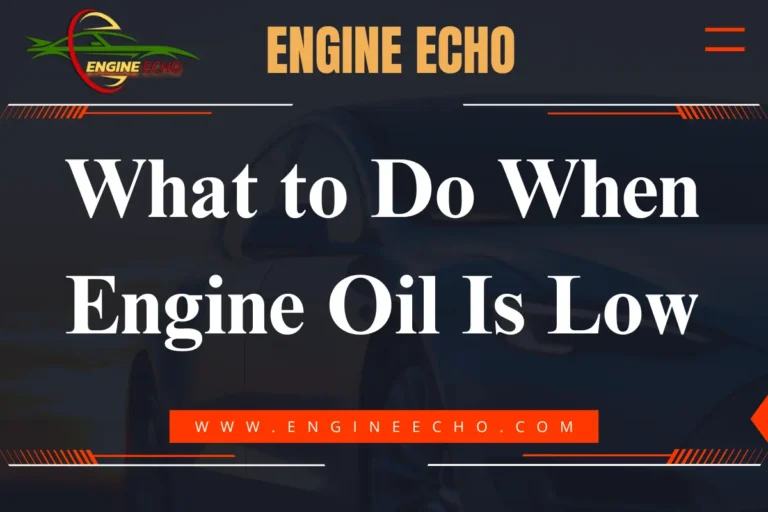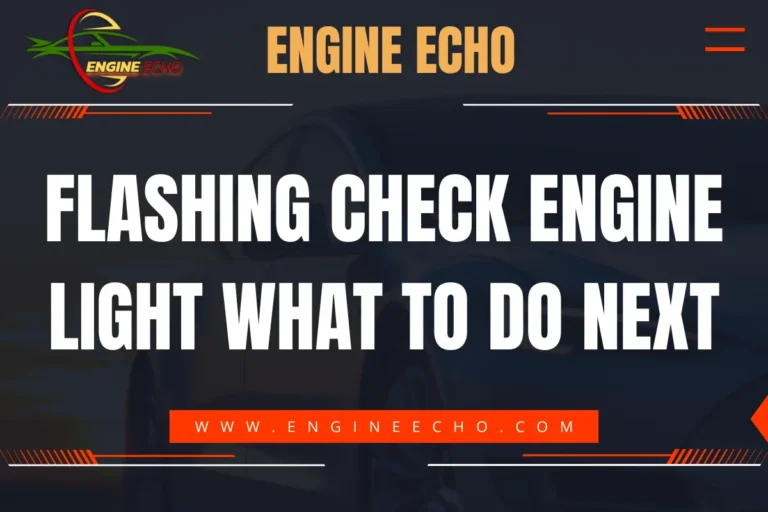Essential Parts for Your Engine

Key Takeaways
- Knowing the essential components of your engine is key to keeping your car running smoothly.
- Regular maintenance of critical parts ensures better performance and a longer engine life.
- Upgrading engine parts can not only boost efficiency but also make driving more fun.
- Spotting signs of wear early can prevent expensive engine repairs.
Introduction to Engine Components
Engines are the heart of any vehicle, and let’s be honest, they deserve more attention than just turning the key and driving off. From my own experience, understanding the essential parts of an engine not only helps you avoid frustrating breakdowns but also saves you money in the long run. Whether you’re a car enthusiast or just someone who wants their car to last, knowing what’s under the hood can make all the difference in extending your vehicle’s life and performance.
Importance of Understanding Engine Parts
When you take the time to learn about engine parts, you’re ahead of the game. You can troubleshoot minor issues before they become major repairs. I’ve found that understanding what’s going wrong under the hood has saved me a ton of trips to the mechanic—and I feel way more confident when dealing with repairs. Plus, using high-quality parts has always given me noticeable improvements in my car’s performance.
Main Parts of an Engine
Engine Block
Think of the engine block like the foundation of a house—everything revolves around it. It’s where combustion happens, and if the block isn’t solid, you’re going to have bigger issues down the road. I’ve been in a situation where I had to choose between an aluminum block and a cast iron block. Aluminum is great if you’re looking for better fuel efficiency, but I went with cast iron for the durability. It’s come in handy, especially on long road trips where the engine faces tougher conditions.
- Aluminum vs. Cast Iron: Aluminum blocks are lighter and boost fuel economy, but if you need strength, especially for towing or performance cars, cast iron is the way to go.
Cylinder Head
The cylinder head sits on top of the engine block, housing valves and spark plugs. It’s one part I’ve always paid close attention to after an unfortunate engine misfire. Diesel engines have tougher cylinder heads, but whether you drive diesel or gasoline, keeping the cylinder head in good condition is crucial.
- Diesel vs. Gasoline Engines: Diesel heads tend to be more durable, but that doesn’t mean gas engines don’t hold their own. Just make sure to check for cracks or warping during routine maintenance.
Pistons
Pistons move up and down inside the cylinders, converting the power from combustion into motion. I upgraded my pistons once while tweaking my car for more performance, and the difference was instantly noticeable. If you want to give your engine a boost, start by looking at the pistons.
- Performance vs. Efficiency: Lightweight, forged pistons are ideal for high-performance builds, while cast pistons work well for everyday driving, especially when efficiency is a priority.
Crankshaft
The crankshaft is what converts the linear motion of the pistons into the rotational motion that powers your wheels. When I was doing some engine upgrades, I had the crankshaft machined to ensure everything ran smoothly, and it was a total game-changer for engine reliability.
- Materials: Forged steel is my go-to when it comes to crankshafts, especially for performance cars. It’s incredibly strong and can handle higher loads without breaking.
Air and Fuel System Components
Carburetor vs. Fuel Injection System
I’ve driven cars with both carburetors and fuel injection systems, and fuel injection wins every time in my book. It’s more efficient, less finicky, and provides better fuel management. Back when I was driving an older model with a carburetor, I constantly had to tweak it for performance, but my newer car’s fuel injection system takes care of that without any hassle.
- Fuel Injection Advantages: If you’re still using a carburetor, it’s worth considering an upgrade to fuel injection. It gives you better efficiency, fewer emissions, and smoother driving overall.
Intake Manifold
I swapped out my stock intake manifold for a performance one, and the increase in airflow was almost immediate. It’s an easy upgrade that can make a big difference, especially if you’re looking for more power under the hood.
- Materials: I prefer aluminum intake manifolds because they strike a good balance between strength and weight. Plastic manifolds are more budget-friendly, but I’ve always found that aluminum lasts longer.
Fuel Pump
If your car sputters at high speeds or struggles to start, it might be time to check the fuel pump. I learned the hard way after my fuel pump failed during a long drive. Since then, I always make sure to replace it before it gives out completely.
- Signs of Failure: Sputtering, stalling, and power loss during acceleration are all red flags that your fuel pump is on its way out.
Cooling System Components
Radiator
A well-maintained radiator is essential for preventing your engine from overheating. I once ignored my radiator’s wear, and trust me, nothing is worse than being stuck on the side of the road during a heatwave.
- Types of Radiators: I recommend crossflow radiators for better heat dissipation, especially if you’re driving in hot climates or pushing your car to its limits.
Water Pump
The water pump keeps coolant circulating through your engine, and if it fails, you’ll know. I once ignored a small leak in the water pump, and it ended up costing me a lot more than if I had addressed it early on. Now, I make sure it’s checked during every routine service.
- Common Issues: Leaks or strange noises are usually signs that your water pump is about to fail. Don’t wait for the warning light—replace it before it goes.
Thermostat
A stuck thermostat can cause your engine to overheat in no time. I once had mine fail while sitting in traffic, and let me tell you, it wasn’t fun. Since then, I never skip checking it during routine maintenance.
Lubrication System Components
Oil Pump
If there’s one thing I’ve learned, it’s that oil is the lifeblood of your engine. Your oil pump circulates that oil to all the important parts, and if it fails, so does your engine. I’ve upgraded mine to a high-performance oil pump, and the peace of mind alone is worth it.
Oil Filter
The oil filter catches all the gunk that can build up in your engine oil. Changing the oil filter regularly is a no-brainer if you want to avoid bigger engine problems down the line. For me, it’s a cheap and easy way to keep my car running smoothly.
Electrical System Components
Battery
There’s nothing worse than getting in your car, turning the key, and realizing the battery is dead. It’s happened to me once or twice, and now I make sure to check my battery regularly. Keeping the terminals clean and replacing the battery every few years saves me from any roadside hassles.
- Longevity Tips: Clean your terminals and carry a portable charger. It’s saved me from calling a tow truck more than once.
Alternator
Ever had your dashboard dim while driving? That’s a sign your alternator might be failing. I ignored it once, and after the third time of getting stuck, I learned my lesson. Now, I make sure the alternator is always in good shape.
Spark Plugs
Spark plugs are tiny but mighty. I’ve swapped out my old spark plugs for iridium ones, and I noticed an immediate improvement in both performance and fuel efficiency. If you haven’t checked yours in a while, it’s worth the time.
Exhaust System Components
Exhaust Manifold
The exhaust manifold directs gases away from the engine. When I upgraded my stock manifold to a stainless steel high-flow version, I could immediately feel the difference in how the engine performed.
Catalytic Converter
A failing catalytic converter will not only hurt your car’s performance but also lead to higher emissions. After mine started acting up, I replaced it, and the improvement was noticeable—not just in the engine but also in my car’s fuel efficiency.
Muffler
I’m all about a nice growl from the engine, but no one wants a car that’s obnoxiously loud. When I swapped out my muffler for a performance model, it hit the perfect balance—louder than stock, but not so much that it’s annoying.
Timing Components
Timing Belt
If you ever want to avoid catastrophic engine damage, pay attention to your timing belt. I had mine snap on an older car, and it was a nightmare. Since then, I never push the recommended replacement intervals.
Camshaft
The camshaft controls when your engine’s valves open and close. I upgraded mine to a performance camshaft a while back, and it gave my car an extra edge in responsiveness. If you’re into performance tuning, it’s definitely worth the investment.
Key Upgrades for Engine Performance
Performance Air Intake
Upgrading to a performance air intake is one of the easiest ways to give your engine a little extra power. I installed one on my daily driver, and I immediately noticed better throttle response and a bit more grunt when I hit the gas.
Turbocharger
There’s nothing quite like the thrill of adding a turbocharger to your engine. After I installed one, the boost in power was exhilarating. Just make sure your engine can handle the extra pressure before diving in.
Performance Exhaust
If you want to improve both the sound and efficiency of your car, upgrading the exhaust is a no-brainer. I upgraded mine, and not only did the car sound better, but it also felt like it was breathing easier, especially at higher RPMs.
Common Signs of Engine Wear
Unusual Noises
Any time you hear a new noise coming from your engine, don’t ignore it. I’ve learned this the hard way. Whether it’s a knock, a rattle, or a squeal, strange sounds usually mean something’s wrong, and catching it early can save you a lot of money.
Decreased Performance
If your car isn’t accelerating like it used to, it’s probably a sign that some parts are wearing down. I’ve noticed this before, and after replacing a few key components, my car was back to running smoothly.
Overheating Issues
Overheating is never a good sign. I ignored a small overheating issue once, and it turned into a much bigger repair than I was expecting. Now, I always make sure my cooling system is in top shape.
Engine Maintenance Tips
Regular Oil Changes
Regular oil changes are the easiest way to keep your engine running well. In my experience, sticking to a consistent schedule not only improves performance but also gives me peace of mind on long trips.
Timing Belt Replacement
If you’ve never replaced your timing belt, do yourself a favor and check the mileage. Trust me, it’s better to replace it before it snaps and destroys your engine. I replace mine like clockwork now to avoid any disasters.
Spark Plug Maintenance
Spark plugs might be small, but they play a huge role in how your engine runs. I check mine every 30,000 miles and replace them when needed—it’s a quick and inexpensive way to keep your car running efficiently.
Case Studies: Real-World Engine Repair and Performance Boosts
Case Study 1: Rebuilding an Old Engine
I once rebuilt an old engine for a vintage car, replacing worn-out parts with performance upgrades. The process was time-consuming and expensive, but the result was a car that not only ran better but also felt brand new.
Case Study 2: Upgrading a Stock Engine
I took a standard stock engine and added a turbocharger and performance exhaust, and it completely transformed the car. The power boost and fuel efficiency gains were immediate, making the upgrades worth every penny.
Conclusion
Engines are complex, but with a little know-how and regular care, they can run smoothly for years. In my experience, maintaining essential engine parts and investing in quality upgrades is the best way to ensure long-lasting performance. Whether you’re looking for better reliability or more power, understanding your engine is the key to making the right decisions for your car.
Frequently Asked Questions (FAQs)
What are the most important parts of an engine to maintain?
The most important components to keep an eye on include the oil pump, timing belt, spark plugs, and cooling system.
How often should I replace my engine’s timing belt?
It depends on your vehicle, but generally, every 60,000 to 100,000 miles is a good rule of thumb. Don’t push it—timing belt failure can be catastrophic.
Can upgrading my engine parts improve fuel efficiency?
Absolutely. Upgrading parts like a turbocharger, exhaust, or performance air intake can improve both power and fuel efficiency.
What are the warning signs of a failing engine part?
Common signs include unusual noises, decreased performance, overheating, and difficulty starting. If you notice any of these, it’s best to get your car checked out before it gets worse.
Thanks for checking out this article on EngineEcho.com! Hope you found this article: "Essential Parts for Your Engine" helpful! If you liked it and want to dive into more car engine topics, head over to our homepage. There's always something new to discover in the world of engines. Enjoy your reading journey!
Check out our previous article: Key Engine Components and Their Functions






